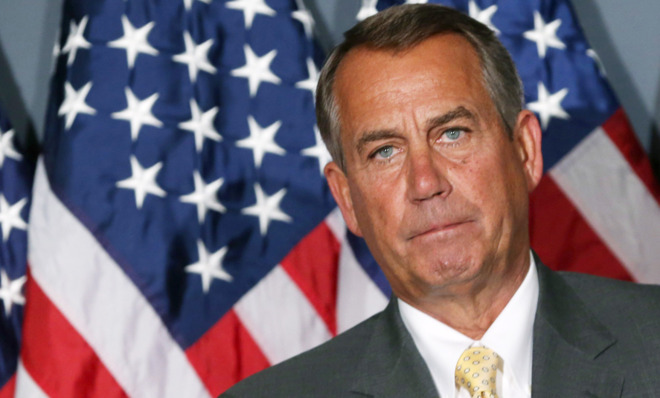The GOP takes another ObamaCare study way out of context
A government report says two-thirds of small businesses might pay higher insurance premiums — but only if you ignore all of ObamaCare's benefits


A free daily email with the biggest news stories of the day – and the best features from TheWeek.com
You are now subscribed
Your newsletter sign-up was successful
It's no secret that Republicans are pinning their midterm election hopes on ObamaCare.
So it should be no surprise that the GOP has tried to cast virtually all news about the health care law as proof that ObamaCare will kill jobs and send insurance costs soaring. The only problem with that strategy is that the underlying arguments are often disingenuous.
In the latest case, a new report from the Centers for Medicare & Medicaid Services estimates that ObamaCare could raise insurance premiums for nearly two-thirds of small businesses, affecting some 11 million employees. Before ObamaCare, those small businesses were paying below-average rates — often by having younger, healthier workers whom insurers could charge less to cover — but new rules designed to level the insurance marketplace will cause those rates to rise, according to the report.
The Week
Escape your echo chamber. Get the facts behind the news, plus analysis from multiple perspectives.

Sign up for The Week's Free Newsletters
From our morning news briefing to a weekly Good News Newsletter, get the best of The Week delivered directly to your inbox.
From our morning news briefing to a weekly Good News Newsletter, get the best of The Week delivered directly to your inbox.
Naturally, right-wing blogs and Republican lawmakers seized on the report to bash ObamaCare. The report revealed another "broken promise" from the Obama administration, House Speaker John Boehner (R-Ohio) said in a statement, calling it "another punch in the gut for Americans already struggling in the president’s economy."
The reality of the report's conclusions, though, are a bit more nuanced.
While the report did find that insurance premiums would probably go up, it did not determine that insurance costs overall would spike. That's because the report focused only on the impact of ObamaCare's new rules, and not, crucially, on the impact of its new benefits.
ObamaCare contains a wealth of subsidies, tax breaks, and the like — many of them geared specifically toward small businesses — that are intended to drive down individuals' insurance costs. When you factor in all the positives, "Obamacare may well be the best thing Washington has done for American small business in decades," The New Yorker's James Surowiecki wrote last year.
A free daily email with the biggest news stories of the day – and the best features from TheWeek.com
The CMS report acknowledged that fact, hedging that there was "a rather large degree of uncertainty associated with this estimate" and that the true impact "will be based on far more factors than the three that are focused on in this report so understanding the effects of just these provisions will always be challenging." And the report specifically mentioned one nongovernmental analysis of the entire law which found that it would have a "minimal" impact on small business premiums.
Moreover, the report estimated that costs would drop for the remaining one-third of small businesses. Why? They're currently paying above-average rates, so the market-leveling rules will actually benefit them.
The GOP hand-wringing comes on the heels of its failed attempt to claim a separate federal report confirmed that ObamaCare will be a job killer. That nonpartisan Congressional Budget Office report actually found that the law would lead to a reduction of labor, not jobs, as incentives made it easier for people to work less or retire early. The GOP's claim was so bogus, in fact, that the CBO released a follow-up statement thoroughly debunking it as an egregious distortion of the truth.
Republicans understandably want to make the health care law look bad to boost their election prospects. But skewing the findings on ObamaCare only hurts their credibility and reveals the party's willful obfuscation on the issue.
Jon Terbush is an associate editor at TheWeek.com covering politics, sports, and other things he finds interesting. He has previously written for Talking Points Memo, Raw Story, and Business Insider.
